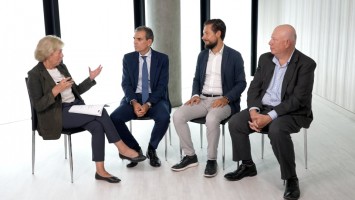Treatment with BAY 2927088 led to durable responses in patients previously treated HER2-mutant NSCLC
Prof Nicolas Girard - Institut Curie, Paris, France
At ELCC 2025 I also presented the results of the SOHO-01 trial which is a phase I/II study with BAY 2927088 which is an oral tyrosine kinase inhibitor targeting HER2. We know that HER2-mutated non-small cell lung cancer is a specific subset of patients, more frequently never smokers, young patients, and we do not have any standard of care for the management of those patients.
At ELCC I presented some expansion cohorts from the SOHO-01 trial and patients received BAY 2927088 at a dosing of 20mg twice daily which was chosen after a dose escalation and [??] cohort. Cohort D was a cohort of patients who were HER2-directed therapy naïve. So these patients had previously received chemotherapy for all of them, some patients, two-thirds of them, had received immune checkpoint inhibitors. 46% of those patients did receive BAY 2927088 as second-line treatment.
In this cohort we see a high response rate of 72% together with a disease control rate of 82% which is obviously very high and shows the potency of this agent to control HER2-mutated non-small cell lung cancer. We have a median duration of treatment of 9.7 months which is obviously meaningful in the clinic.
I also reported the results from Cohort E, which is a cohort of patients, heavily pretreated patients. Most of these patients received BAY 2927088 as first-line treatment and beyond after chemotherapy, after immunotherapy and after at least one line of antibody-drug conjugate, mostly T-DXd . In this cohort we see a quite high response rate of 35%, a disease control rate of 53% and median duration of treatment of again 9 months which is unexpected in this context of heavily pretreated patients.
So this compound, BAY 2927088, is highly promising, not only in the late-line setting but also in the first-line setting. We know in the clinic that targeted agents are more effective when given early in the treatment sequencing and the SOHO-02 trial is ongoing that compares in a phase III trial BAY 2927088 to standard of care chemotherapy.
Is there anything else you would like to add?
I think during this ELCC 2025 meeting we see many new data, many data regarding targeted agents. We have also many studies reporting on the treatment of KRAS mutated non-small cell lung cancer patients. We have new data regarding immune checkpoint inhibitors, especially delivered in a subcutaneous formulation which is obviously highly promising for the healthcare organisation and the patient quality of life. So a multidisciplinary discussion, very nice, and an important meeting for the thoracic oncology community.








